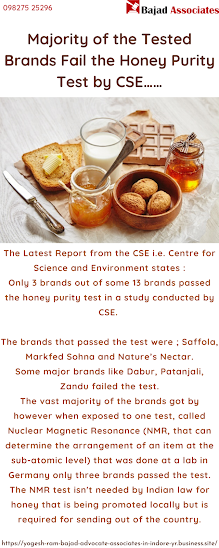Majority of the Tested Brands Fail the Honey Purity Test by CSE……
Latest News about the honey adulteration report by CSE.......
Well we
all know honey, we eat it, it's liked by some and disliked by some but we all
agree honey has some medicinal benefits and used by many of us for various
medicinal or non-medicinal purposes. With the advent of COVID-19 honey is being
used widely as one of the many immunity boosters. Now if i have to tell you the
branded honey that you are relying on is adulterated…… Some of you may believe
me and some may not because you think its branded, well-known brand, you
believe, it you are using it from such a long time but that's what the latest report from the CSE i.e. Centre for Science and
Environment states.
 |
| Honey adulteration Report by CSE |
Some of the major and well-known
brands of India failed the test by CSE or to put it like that only 3 brands out
of some 13 brands passed the test. Yes…… you read it right, some major brands
like Dabur, Patanjali, Zandu failed the test. The brands that passed the test were:
Saffola, Markfed Sohna and Nature’s Nectar (one sample of two). Multiple
samples of honey were tested. These samples were of raw and processed
honey.
The vast majority of the brands got passed by almost all test however when exposed to one test, called Nuclear Magnetic Resonance (NMR, that can determine the arrangement of an item at the sub-atomic level) that was done at a lab in Germany only three brands passed the test.
The
NMR test isn't needed by Indian law for honey that is being promoted locally
but is required for sending out of the country.
However Dabur refuted the claim citing a July 20 report from a German company, Bruker, which is listed as a manufacturer of NMR imaging products, and performed a test of Dabur’s honey composition profile. That report, which The Hindu (a newspaper) perused, says there was no evidence of sugar syrup. “Dabur is the only company in India to have NMR testing equipment in our own laboratory, and the same is used to regularly test our honey being sold in the Indian market. This is to ensure that Dabur Honey is 100% pure without any adulteration,” the accompanying statement noted.
The CSE examination additionally said some Indian
organizations in the honey business were bringing in manufactured sugar syrups
from China to contaminate honey.
These syrups, said Ms.
Narain, were prepared to make it look like honey , even up to half of which
were blended in with sugar, as 'unadulterated honey’. Among the tests utilized
according to Indian guidelines is one to check whether the nectar is corrupted
with C4 sugar (genuine sweetener) or C3 sugar (rice sugar). Most examples
cleared these tests however bombed another test called the Trace Marker for
Rice test, to test for rice syrup defilement.
Adulteration of food is
a global problem and so is the problem of adulterated honey. It's a global
phenomenon and many countries are trying to deal with it. For now many
countries and India itself are coming up with some new regulation and stricter tests to
deal with the issue. Many poor bee farmers face difficulty in making profit by selling priced
but pure honey because sugar syrup filled and adulterated honey is being sold
at much lower prices and that too labeled as pure, as per CSE.



Comments
Post a Comment